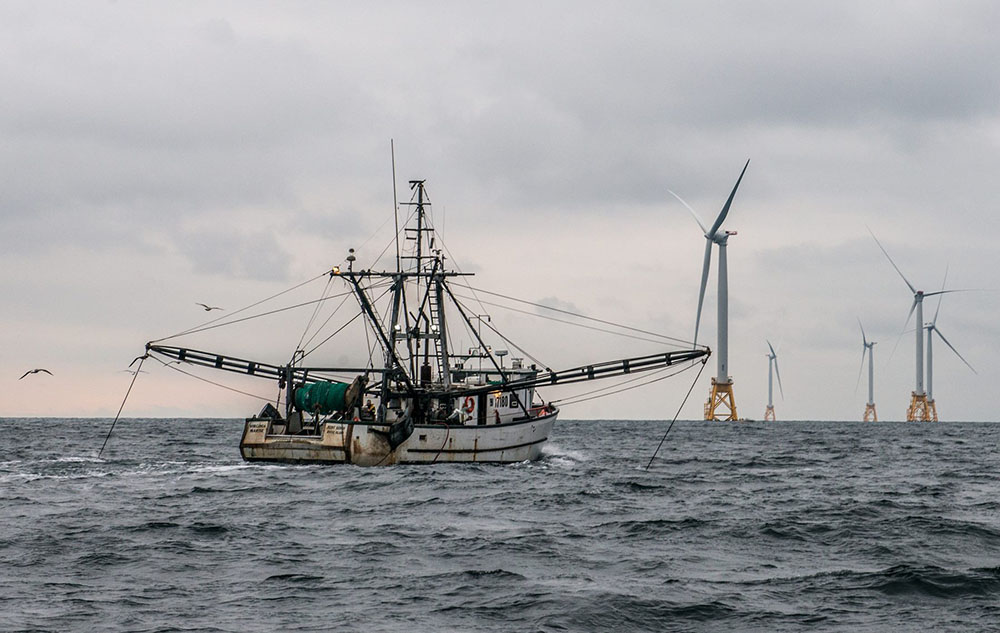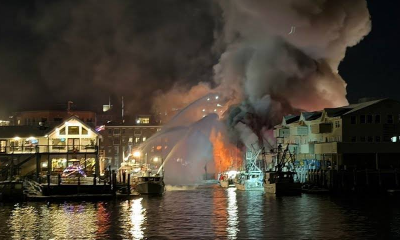Saying the Northeast fishing industry has been “systematically marginalized in the permitting process,” the Responsible Offshore Development Alliance sued the federal Bureau of Ocean Energy Management Monday over its July 15 approval of the Vineyard Wind offshore wind energy project.
The group, a coalition of fishermen and coastal communities, filed a petition for review in the First Circuit U.S. Court of Appeals challenging the permit for the 800-megawatt project off southern Massachusetts.
“BOEM’s hasty approval of this project, which could be the nation’s first commercial scale offshore wind installation, adds unacceptable risk to this sustainable industry without any effort to minimize unreasonable interference with traditional and well-managed seafood production and navigation,” the group said in a statement announcing the legal action.
“This is a precedent-setting decision by BOEM, and it is critical that they get it right so that future projects are following a trusted roadmap instead of a flawed and dangerous example,” said Anne Hawkins, RODA’s executive director. “Unfortunately, this lawsuit is the only recourse fishermen have to ensure the fishing communities' concerns are addressed.”
Hawkins said this is the first court challenge to a BOEM offshore wind construction and operation plan (COP) approval. The plaintiffs decided to go to the federal appeals court because offshore oil and gas cases are brought at that level.
“A construction and operations plan looks a lot like an oil production plan,” she said.
The petition to the court, submitted for RODA by attorney Roger J. Marzulla of the Washington, D.C. law firm Marzulla Law, also asks the court to review earlier agency decisions including a March 12 final environmental impact statement, an authorization from the National Marine Fisheries Service for incidental harassment of marine mammals, and the Corps of Engineers’ Section 404 permit for dredging and discharges.
Specifically the complaint alleges the agencies violated the Outer Continental Shelf Lands Act, the National Environmental Policy Act, the Clean Water Act, the Administrative Procedure Act, the Endangered Species Act, the Marine Mammal Protection Act, and the Merchant Marine Act of 1920 – better known as the Jones Act, governing maritime commerce in U.S, waters.
RODA and other fishermen have consistently engaged for years in talks with BOEM and wind developers but are not seeing the concerns addressed in the agency’s decision making, according to RODA.
“The project design approved by BOEM would endanger fishermen by placing turbines too close together for fishing vessels to safely navigate in inclement weather or heavy seas,” the group said. “Based on their understanding of the connectivity of marine systems, fishermen have also repeatedly requested a cumulative impact assessment of offshore wind development to fish and protected resources.
“Unfortunately, BOEM has not taken a holistic approach to address the cumulative impact of offshore wind on the ocean ecosystem and shoreside communities. It is impossible to effectively plan a new ocean industry without such an analysis, especially one with such a large environmental footprint.”
Offshore wind energy development can be part of the national policy response to climate change, RODA said, “but in a way that deliberatively minimizes these emerging technologies’ direct impacts to marine ecosystems, biodiversity, and food security.”
The court filing comes a month after BOEM Director Amanda Lefton’s Aug. 10 written response to RODA over its Vineyard Wind concerns, and a promise that the agency is working to improve its relationship with the industry.
Lefton cited the Vineyard project as an example where the agency heard RODA’s recommendations, but ultimately came to a different conclusion.
“We recognize that your membership has serious concerns about the process and whether your input is being taken into account. We value the fishing communities’ input, give it serious consideration, and have incorporated it into many offshore wind decisions,” wrote Lefton.
“Most recently, in the Vineyard Wind 1 Environmental Impact Statement (EIS), BOEM analyzed a RODA-supported (vessel) transit lane alternative, but ultimately chose an east-west grid turbine layout proposed by a large segment of the commercial fishing industry in that area,” Lefton’s letter stated.
“In addition, the Vineyard Wind 1 Record of Decision (ROD) established a gear loss and revenue compensation fund and adopted measures that will provide biological and environmental data to inform mitigation activities.”
In its reply last month, RODA welcomed Lefton’s gesture, even while making clear the gaps between fishermen and the agency.
“We do want to work with the agency, that was genuine,” Hawkins said Monday afternoon after the court filing. The future posed by Vineyard Wind is still a problem for the industry, despite “hundreds of hours” spent in meetings and hearings, she said.
“If you show up, and show up, and show up…they (fishermen) expect to see some accommodation,” she said. “We had long discussions among our board members and decided this (court action) was the way to go.”







